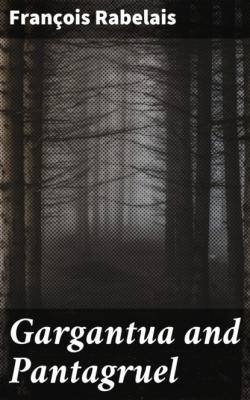Gargantua and Pantagruel. Francois Rabelais
Читать онлайн.| Название | Gargantua and Pantagruel |
|---|---|
| Автор произведения | Francois Rabelais |
| Жанр | Языкознание |
| Серия | |
| Издательство | Языкознание |
| Год выпуска | 0 |
| isbn | 4064066121273 |
Chapter 1.XXVI.—How the inhabitants of Lerne, by the commandment of Picrochole their king, assaulted the shepherds of Gargantua unexpectedly and on a sudden.
The cake-bakers, being returned to Lerne, went presently, before they did either eat or drink, to the Capitol, and there before their king, called Picrochole, the third of that name, made their complaint, showing their panniers broken, their caps all crumpled, their coats torn, their cakes taken away, but, above all, Marquet most enormously wounded, saying that all that mischief was done by the shepherds and herdsmen of Grangousier, near the broad highway beyond Seville. Picrochole incontinent grew angry and furious; and, without asking any further what, how, why, or wherefore, commanded the ban and arriere ban to be sounded throughout all his country, that all his vassals of what condition soever should, upon pain of the halter, come, in the best arms they could, unto the great place before the castle, at the hour of noon, and, the better to strengthen his design, he caused the drum to be beat about the town. Himself, whilst his dinner was making ready, went to see his artillery mounted upon the carriage, to display his colours, and set up the great royal standard, and loaded wains with store of ammunition both for the field and the belly, arms and victuals. At dinner he despatched his commissions, and by his express edict my Lord Shagrag was appointed to command the vanguard, wherein were numbered sixteen thousand and fourteen arquebusiers or firelocks, together with thirty thousand and eleven volunteer adventurers. The great Touquedillon, master of the horse, had the charge of the ordnance, wherein were reckoned nine hundred and fourteen brazen pieces, in cannons, double cannons, basilisks, serpentines, culverins, bombards or murderers, falcons, bases or passevolins, spirols, and other sorts of great guns. The rearguard was committed to the Duke of Scrapegood. In the main battle was the king and the princes of his kingdom. Thus being hastily furnished, before they would set forward, they sent three hundred light horsemen, under the conduct of Captain Swillwind, to discover the country, clear the avenues, and see whether there was any ambush laid for them. But, after they had made diligent search, they found all the land round about in peace and quiet, without any meeting or convention at all; which Picrochole understanding, commanded that everyone should march speedily under his colours. Then immediately in all disorder, without keeping either rank or file, they took the fields one amongst another, wasting, spoiling, destroying, and making havoc of all wherever they went, not sparing poor nor rich, privileged or unprivileged places, church nor laity, drove away oxen and cows, bulls, calves, heifers, wethers, ewes, lambs, goats, kids, hens, capons, chickens, geese, ganders, goslings, hogs, swine, pigs, and such like; beating down the walnuts, plucking the grapes, tearing the hedges, shaking the fruit-trees, and committing such incomparable abuses, that the like abomination was never heard of. Nevertheless, they met with none to resist them, for everyone submitted to their mercy, beseeching them that they might be dealt with courteously in regard that they had always carried themselves as became good and loving neighbours, and that they had never been guilty of any wrong or outrage done upon them, to be thus suddenly surprised, troubled, and disquieted, and that, if they would not desist, God would punish them very shortly. To which expostulations and remonstrances no other answer was made, but that they would teach them to eat cakes.
Chapter 1.XXVII.—How a monk of Seville saved the close of the abbey from being ransacked by the enemy.
So much they did, and so far they went pillaging and stealing, that at last they came to Seville, where they robbed both men and women, and took all they could catch: nothing was either too hot or too heavy for them. Although the plague was there in the most part of all the houses, they nevertheless entered everywhere, then plundered and carried away all that was within, and yet for all this not one of them took any hurt, which is a most wonderful case. For the curates, vicars, preachers, physicians, chirurgeons, and apothecaries, who went to visit, to dress, to cure, to heal, to preach unto and admonish those that were sick, were all dead of the infection, and these devilish robbers and murderers caught never any harm at all. Whence comes this to pass, my masters? I beseech you think upon it. The town being thus pillaged, they went unto the abbey with a horrible noise and tumult, but they found it shut and made fast against them. Whereupon the body of the army marched forward
